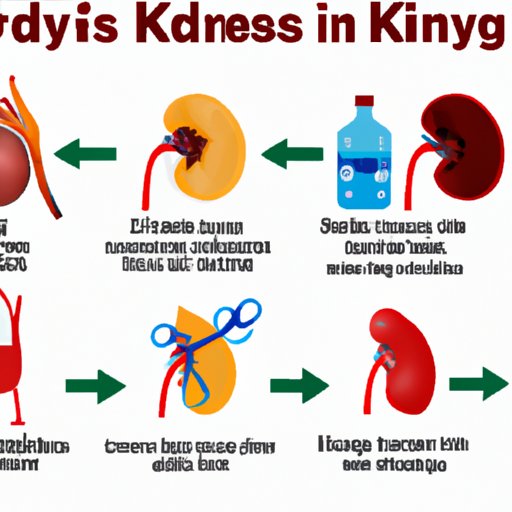
How to Reverse Kidney Disease with Lifestyle Changes and Medical Treatment
Kidney disease is a prevalent and serious health issue that affects millions of people worldwide. According to the National Kidney Foundation, one in three adults in the United States is at risk of developing kidney disease. Early detection and treatment are crucial in preventing further damage to the kidneys and reversing the disease’s progression. In this article, we will explore various ways to reverse kidney disease, including kidney-healthy foods, quitting smoking and limiting alcohol, staying hydrated, regular exercise and weight management, and medical treatments. Furthermore, we will share inspiring success stories of people who have miraculously reversed their kidney disease through lifestyle modifications and medical treatments.
Stages of Kidney Disease and Their Identification
Kidney disease progresses in five stages, with the fifth stage being the most severe and requiring dialysis or a kidney transplant. The earlier the detection of the disease, the better the chances of slowing down its progression. The first stage of kidney disease has no visible symptoms, but a urine test can determine if there is a protein leakage in the urine caused by damaged kidneys. As the disease progresses, symptoms like fatigue, loss of appetite, swelling in the feet and ankles, and high blood pressure, among others, become evident. Regular checkups and testing, especially for people who are at high risk, such as people with diabetes, high blood pressure, and a family history of kidney disease, are vital in detecting the disease during its early stages.
Kidney-Healthy Foods
Kidney-healthy diets involve consuming a balanced intake of fruits, vegetables, lean proteins, and low-fat dairy products. A registered dietitian can provide expert advice on the best diet for people with kidney disease. Foods rich in antioxidants and anti-inflammatory properties, like berries, red grapes, and fish oils, are recommended. Foods high in fiber, like whole grains, oats, and vegetables, can help regulate blood sugar levels and reduce the risk of diabetes, one of the leading causes of kidney disease. Avoiding foods high in salt and potassium, like processed foods, canned foods, and fast foods, can help regulate blood pressure levels and reduce the strain on the kidneys.
Quitting Smoking and Limiting Alcohol
Smoking has a significant impact on kidney health, and quitting smoking can improve kidney function and slow down the progression of the disease. Smoking is one of the leading causes of several chronic illnesses, including kidney disease. Alcohol consumption in large quantities for an extended period can cause liver and kidney damage. Reducing alcohol intake and quitting smoking can help improve kidney function and prevent further damage.
The Importance of Staying Hydrated
The kidneys rely on water to flush out toxins from the body. Staying hydrated by drinking enough water throughout the day can help improve kidney function and maintain overall health. Drinking water helps regulate body temperatures, lubricates joints, and helps maintain healthy skin. People with kidney disease should consult their healthcare provider to determine the best amount of water for their condition.
Regular Exercise and Weight Management
Regular physical exercise and weight management can help improve kidney function and slow down the disease’s progression. Exercise helps regulate blood sugar levels, lower blood pressure, and maintain healthy weight levels. Body mass index (BMI) is an essential factor that determines the risk of developing kidney disease. People with a BMI of 30 or above are at high risk for developing kidney disease and should engage in weight management strategies like regular exercise and a balanced diet.
Medical Treatments
Medical treatments like dialysis and kidney transplant are options for people with advanced stages of kidney disease. Dialysis is a procedure that filters waste products from the blood when the kidneys can no longer perform the function. Kidney transplant is a surgery that replaces the damaged kidney with a healthy one from a donor. However, these treatments are expensive, need life-long medication, and, in some cases, have complications. Therefore, specialized consultation with healthcare professionals is vital for the patients and their relatives to make sound decisions.
Inspiring Stories
Several people have had success in reversing their kidney disease through lifestyle changes and medical treatments. For instance, a woman named Monica, diagnosed with kidney disease at stage four, changed her diet to include more fruits and vegetables and cut off meat from her diet. She started exercising and lost some weight. Now, after regular check-ups, her kidney function has improved, and she is in stage two of the disease. During the kidney function decline, a retired firefighter named George underwent kidney transplant and today has a new lease of life. He emphasizes the importance of a positive mindset in fighting the disease and maintaining a healthy lifestyle.
Conclusion
Kidney disease affects millions of people worldwide, and early detection and treatment are crucial in reversing the disease’s progression. By incorporating kidney-healthy foods into your diet, quitting smoking and limiting alcohol, staying hydrated, regular exercise and weight management, and medical treatments like dialysis and kidney transplant, you can improve your kidney function and slow down the disease’s progression. Several success stories prove that it is possible to reverse kidney disease by combining lifestyle modifications and medical treatments. Consult with healthcare professionals for personalized treatment options. Reversing kidney disease is a journey that requires dedication and effort but is possible with the right mindset.





